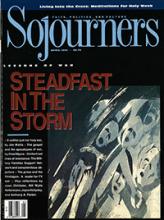On January 22, 1991, Pax Christi USA with Sojourners held a service of repentance at St. Aloysius Church in Washington, DC, a march for peace, and, a public vigil at the White House to protest the war in the Persian Gulf. Preparation for the event included two sessions of nonviolence training and a press conference. Joan Chittister, OSB, a Sojourners contributing editor and, when this article appeared, the executive director of the Alliance for International Monasticism, delivered the following speech to the press that day.
-- The Editors
I am here this afternoon to speak for 21 heads of religious communities in the United States of America and 39 representatives of other religious orders. We have come to ask the government of our country to live up to our ideals as a "nation under God."
We have points to be made that must be made clearly. First of all, we do indeed reject and condemn unequivocally Iraq's invasion of Kuwait. We do, secondly, clearly support our troops. We support them so much, in fact, that we would like to bring them home physically and psychologically whole. We know now as a result of our experience in Vietnam that there was one psychological impairment for every four physical wounds suffered in that war due to its intensity, the psychiatrists tell us. But we have spent an entire week in this country applauding at the highest levels the intensity with which we are waging this conflict.
We are not here as religious leaders because we are unpatriotic but because we are patriotic enough to protest what is clearly an anti-American war being waged by us and against our own democratic principles.
Read the Full Article
